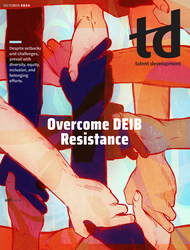TD Magazine Article
Member Benefit
Leadership Development With a Limited Budget
Despite resource constraints, a municipality’s training program for aspiring
and rising leaders has enabled participants to advance their careers.
Tue Oct 01 2024

Bookmark
Recruiting top talent is as competitive as it's ever been. Attracting staff can be an expensive endeavor for any employer, with retaining that talent an equally overwhelming financial burden. The abundant work involved in maintaining the state of Georgia's oldest city, Savannah, forces the city to continue to creatively approach the challenges of recruiting and retaining talent within the sometimes-inflexible boundaries of municipal governance.
You've Reached ATD Member-only Content
Become an ATD member to continue
Already a member?Sign In

More from ATD
